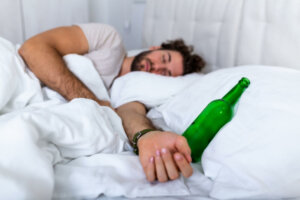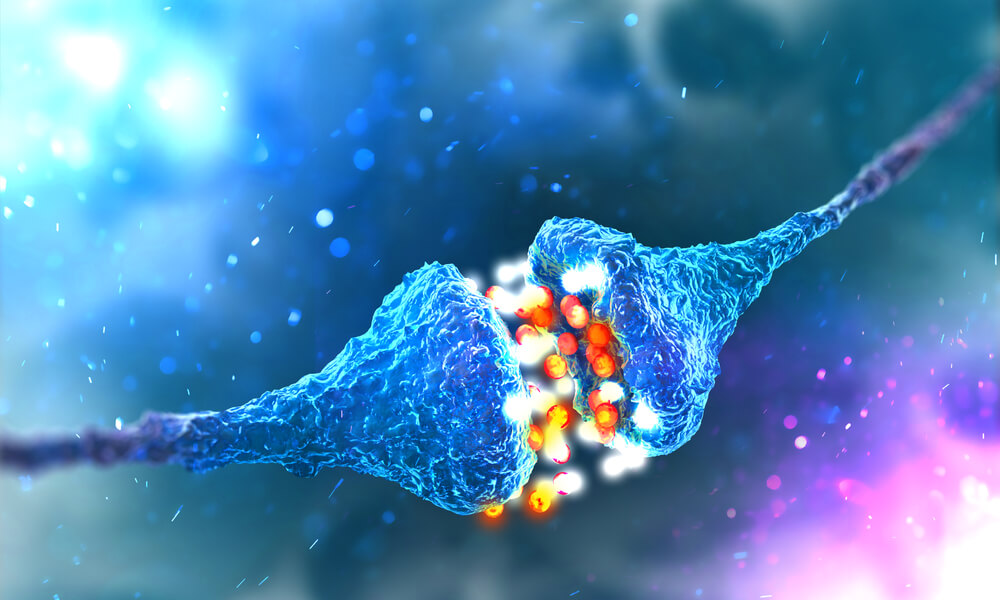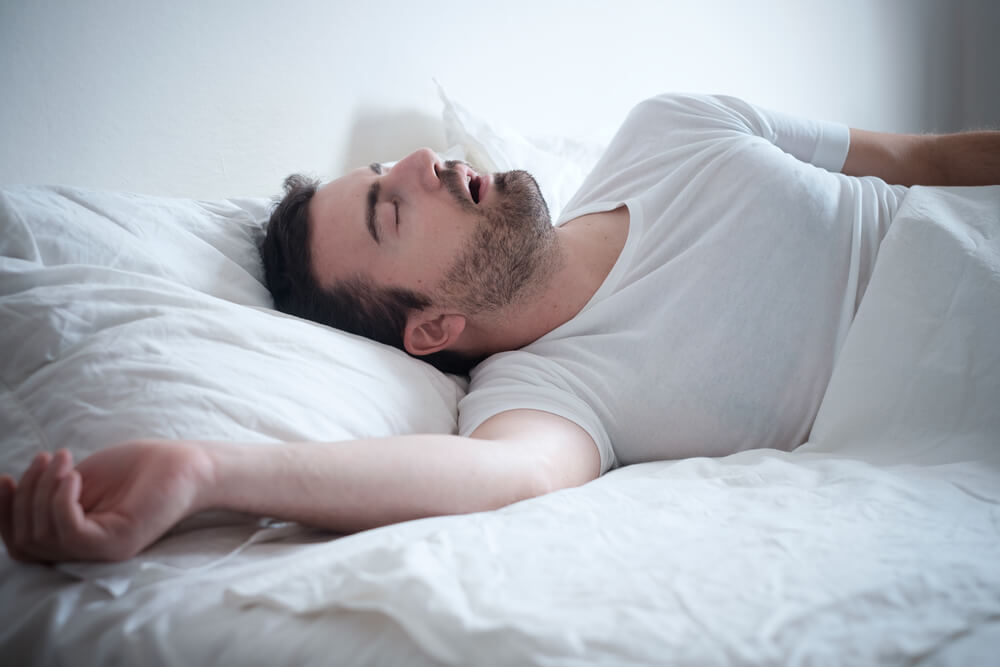Drinking Alcohol Before Bed Negatively Affects Your Sleep

If you suffer from insomnia, you might choose to have an alcoholic drink before bed, thinking that it’ll help you sleep. However, science has found that this isn’t the case. In fact, alcohol can actually increase your difficulty in sleeping.
It’s true that alcohol causes drowsiness and, in principle, helps you to relax. That’s the reason why you might think it helps you sleep.
However, science has discovered that drinking alcohol before bed affects your normal rhythm of sleep and also reduces the quality. The result is that you don’t get enough rest. Furthermore, over time you might develop a dependency on alcohol that damages your health.
“First you take a drink, then the drink takes a drink, then the drink takes you.”
-F. Scott Fitzgerald-
Drinking alcohol before bed
Drinking alcohol before going to sleep causes a series of reactions in your body. On its own, alcohol is a central nervous system inhibitor. This means that it changes the way in which neurotransmitters work in the brain. They’re responsible for regulating various of your psychic processes.
When neurotransmitters don’t work the way they should, changes can occur in how you feel and think. For example, alcohol reduces the production of glutamate, a neurotransmitter associated with alertness. The result is that you may experience more anxiety, stress, or depression.
Something similar happens with another neurotransmitter called gamma-aminobutyric acid (GABA) and several others. These alterations lead to an abnormal sleep pattern.

You can’t get a good night’s sleep
Drinking alcohol before going to sleep leads to disturbed sleep cycles. The consequence of this is that you don’t feel properly rested.
Normally, during the night there are between five and six sleep cycles. Each one is made up of several phases. A cycle lasts between 90 and 100 minutes. Each cycle generally includes phases of deep sleep and others of light sleep.
Several studies have shown that drinking alcohol before sleeping causes the phases of deep sleep to be noticeably shortened. This means that you sleep, but it isn’t a restful sleep.
For the same reason, drinking alcohol before sleeping means you tend to wake up several times during the night and feel tired the next day. You might also experience muscle aches. In addition, during the day you may have difficulty concentrating and, in general, experience decreased cognitive performance. In the long term, this can affect your memory.
Some physical effects of drinking alcohol before bed
Another effect of drinking alcohol before sleeping is that it often affects your breathing rate as well. In fact, by not achieving the required phases of deep sleep, which is when your breathing becomes slower and deeper, you might experience some respiratory distress during the night.
This could result in you developing sleep apnea. The first manifestation of this problem is snoring. Indeed, snoring is extremely common in those who drink alcohol before going to bed.
A person with obstructive sleep apnea has irregular breathing. In fact, it even stops briefly at times. When this happens, the amount of oxygen reaching the brain decreases. In the long run, this becomes a risk factor for developing hypertension and other health problems.

What to do?
It’s advisable not to drink alcohol before sleeping. Nevertheless, if, for some reason, you really don’t want to deprive yourself of a drink at night, you should drink it two or three hours before going to bed. In this way, it won’t affect your quality of sleep.
You could also try drinking two glasses of water for every glass of alcoholic beverage you consume. This helps you remove the alcohol from your body more quickly. However, try to avoid sparkling drinks, as these tend to cause gas and therefore put more stress onto your body.
Finally, if you have insomnia problems, alcohol isn’t the answer. The most appropriate thing to do is to consult your doctor for advice. In addition, you might find relaxation techniques and increased daytime physical activity will help you achieve a better night’s sleep.
If you suffer from insomnia, you might choose to have an alcoholic drink before bed, thinking that it’ll help you sleep. However, science has found that this isn’t the case. In fact, alcohol can actually increase your difficulty in sleeping.
It’s true that alcohol causes drowsiness and, in principle, helps you to relax. That’s the reason why you might think it helps you sleep.
However, science has discovered that drinking alcohol before bed affects your normal rhythm of sleep and also reduces the quality. The result is that you don’t get enough rest. Furthermore, over time you might develop a dependency on alcohol that damages your health.
“First you take a drink, then the drink takes a drink, then the drink takes you.”
-F. Scott Fitzgerald-
Drinking alcohol before bed
Drinking alcohol before going to sleep causes a series of reactions in your body. On its own, alcohol is a central nervous system inhibitor. This means that it changes the way in which neurotransmitters work in the brain. They’re responsible for regulating various of your psychic processes.
When neurotransmitters don’t work the way they should, changes can occur in how you feel and think. For example, alcohol reduces the production of glutamate, a neurotransmitter associated with alertness. The result is that you may experience more anxiety, stress, or depression.
Something similar happens with another neurotransmitter called gamma-aminobutyric acid (GABA) and several others. These alterations lead to an abnormal sleep pattern.

You can’t get a good night’s sleep
Drinking alcohol before going to sleep leads to disturbed sleep cycles. The consequence of this is that you don’t feel properly rested.
Normally, during the night there are between five and six sleep cycles. Each one is made up of several phases. A cycle lasts between 90 and 100 minutes. Each cycle generally includes phases of deep sleep and others of light sleep.
Several studies have shown that drinking alcohol before sleeping causes the phases of deep sleep to be noticeably shortened. This means that you sleep, but it isn’t a restful sleep.
For the same reason, drinking alcohol before sleeping means you tend to wake up several times during the night and feel tired the next day. You might also experience muscle aches. In addition, during the day you may have difficulty concentrating and, in general, experience decreased cognitive performance. In the long term, this can affect your memory.
Some physical effects of drinking alcohol before bed
Another effect of drinking alcohol before sleeping is that it often affects your breathing rate as well. In fact, by not achieving the required phases of deep sleep, which is when your breathing becomes slower and deeper, you might experience some respiratory distress during the night.
This could result in you developing sleep apnea. The first manifestation of this problem is snoring. Indeed, snoring is extremely common in those who drink alcohol before going to bed.
A person with obstructive sleep apnea has irregular breathing. In fact, it even stops briefly at times. When this happens, the amount of oxygen reaching the brain decreases. In the long run, this becomes a risk factor for developing hypertension and other health problems.

What to do?
It’s advisable not to drink alcohol before sleeping. Nevertheless, if, for some reason, you really don’t want to deprive yourself of a drink at night, you should drink it two or three hours before going to bed. In this way, it won’t affect your quality of sleep.
You could also try drinking two glasses of water for every glass of alcoholic beverage you consume. This helps you remove the alcohol from your body more quickly. However, try to avoid sparkling drinks, as these tend to cause gas and therefore put more stress onto your body.
Finally, if you have insomnia problems, alcohol isn’t the answer. The most appropriate thing to do is to consult your doctor for advice. In addition, you might find relaxation techniques and increased daytime physical activity will help you achieve a better night’s sleep.
All cited sources were thoroughly reviewed by our team to ensure their quality, reliability, currency, and validity. The bibliography of this article was considered reliable and of academic or scientific accuracy.
Nagore, G. (2011). Ahogarse en alcohol. Monografías. com (online) Disponible en la URL: www. comoves. unam. mx/artículos/ahogarse. html. Acceso el, 12.
This text is provided for informational purposes only and does not replace consultation with a professional. If in doubt, consult your specialist.







